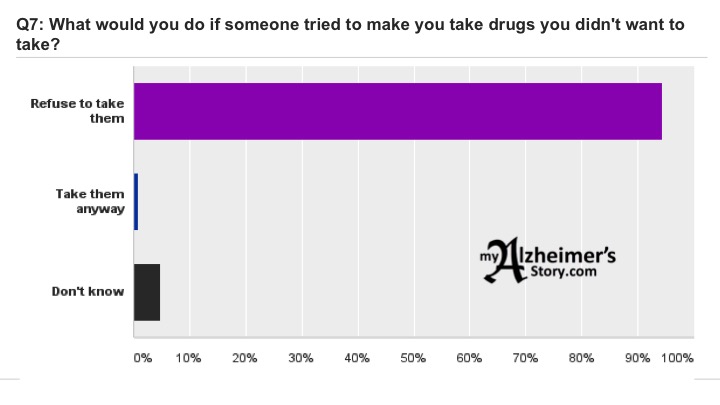
Care partners and care staff may become frustrated when someone who lives with dementia declines to take medications that care partners and care staff believe are beneficial for the person living with dementia.
If you are one of those care partners or care staff, asking yourself these 20 questions might help address that frustration, and give you a different perspective on why people with dementia might choose to decline taking medication.
- Do I know why I’m giving this person this medication in this dose at this time?
- Is the medication necessary? If it was necessary before, is it still? Has that been tested for in some way recently (e.g. by slowly lowering the dose)? If it hasn’t, should it be?
- Could the dosage be reduced? Could the medication be eliminated completely?
- What are the risks associated with this medication? What are the benefits? Do the benefits outweigh the risks? Or do the risks outweigh the benefits?
- What are the consequences if a dose is missed? What are the consequences if a dose is delayed? Do the benefits of skipping or delaying a dose outweigh the risks?
- Have I researched non-pharmacological ways to address whatever issue the medication is meant to address? Have I tried them? If so, what happened? If they “failed,” did I ask myself why? Have I tried non-pharmacological means a second time? Have I tried them repeatedly?
- What would I do if someone tried to give me drugs I didn’t want or need and/or that made me feel funny, sleepy or ill? How would I feel if a stranger tried to give me pills and I didn’t know what they were?
- What are the side effects of the medication? Have I read and do I understand the information sheet for this particular drug? Do I know how this drug interacts with others? What are the contraindications?
- What obvious effect or effects does the medication have on the person I’m giving it too? If I don’t know what the effects are for this person in particular, when can I make time to observe the effects carefully? What effect or effects might the medication have that may not be immediately visible or obvious to me?
- Could the medication be interacting in a negative way with other medications the person is taking or foods she or he is eating such as grapefruit for example?
- Have I considered the fact that taking the medication may cause the person distress or discomfort?
- In the past, have I regularly asked the person how she or he feels after she or he has taken the medication? Have I asked after the drug is meant to have taken effect?
- Does the medication taste bad, look bad or smell bad? Is the medication hard to swallow? Does it feel funny (e.g. stinging, hot, or cold) going down?
- How do I react when people order me to do things I don’t want to do or that I know will have negative consequences for me? How do I react when people think they know better than I do what’s best for me? How do I feel when people try to control me, tell me what to do or treat me like a child?
- How do strong medications affect me when I take them? How does it feel when I have adverse effects from taking medicine?
- Is taking medicine something I generally look forward to? Or is it something I would prefer not to do, but I do it because I have to under “doctors orders”?
- Would I want to take drugs that put me to sleep or made me feel anxious or nauseous or produced other unpleasand effects?
- How do I feel about taking medication in general? Do I think it’s a good thing or a bad thing? How does the person I’m giving the medication to feel about taking medicine in general?
- When and why have I taken medicine? How does being ill cause me to feel? Do I usually feel comfortable or uncomfortable? Do I tend to be happy and cheerful, or otherwise?
- Have I ever stopped talking a medication that’s been prescribed for me because I didn’t think it was working, or I didn’t like the way it made me feel, or I just felt I should stop for no particular reason?
How did you answer question 14? If you are like 94% of the 1,300+ people who have answered my short survey on behaviour, you would refuse to take drugs you didn’t want to take (as shown in the graph below). Think about that the next time a person who is living with dementia chooses not to take the drugs you want to give them.

#mc_embed_signup{background:#fff; clear:left; font:14px Helvetica,Arial,sans-serif; }
/* Add your own MailChimp form style overrides in your site stylesheet or in this style block.
We recommend moving this block and the preceding CSS link to the HEAD of your HTML file. */
Subscribe to MAS now & get 5 free PDFs & a page of welcome links:
Take my short survey on behaviour here.
Image copyright: bialasiewicz / 123RF Stock Photo



